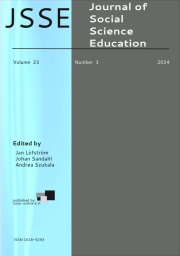Between compassion, anger, resignation, and rebellion: Vocational civics teachers and their struggle to fulfil the intentions of the civics subject
DOI:
https://doi.org/10.11576/jsse-6757Keywords:
civics education, democratic citizenship, vocational training, discourse analysis, street-level bureaucratsAbstract
Highlights:
– Civics teachers face challenges in offering male vocational students quality citizenship education.
– Civics teachers perceive this student group as vulnerable and in need of extra support.
– When unable to offer desired civics education, teachers feel angry and resigned.
– Civics teachers are willing to bend certain rules to support this particular student group.
– If this student group lacks better civics education, their future and Sweden's democracy are at risk.
Purpose: This paper examines how vocational civics teachers navigate structural constraints and their understanding of the challenges involved in preparing vocational students for democratic citizenship.
Design/methodology/approach: Using a discoursive psychological approach to analyse interview material, the study discusses identified discourses about critical policy analysis and street-level bureaucracy theory.
Findings: The findings reveal that the structure of vocational upper-secondary education significantly constrains civics teachers. Teachers oscillate between feelings of compassion, anger, resignation, and rebellion as they attempt to manage these challenges.
Research limitations/implications: The study highlights the need for further ethnographic research on teaching practices.
Practical implications: A significant number of Swedish upper-secondary students receive a limited civics education that inadequately prepares them for democratic citizenship.
Downloads
Published
How to Cite
Issue
Section
License
Copyright (c) 2024 JSSE - Journal of Social Science Education

This work is licensed under a Creative Commons Attribution-ShareAlike 4.0 International License.



